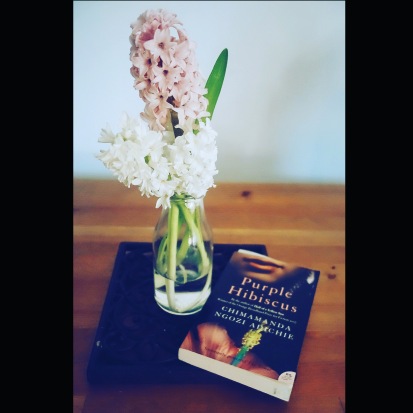Story: 4/5
Writing: 5/5
Overall: 4.5/5

I have been struggling to write this book review for a while. Not because I hated it but because I admire Chimamanda Ngozi Adichie so much, I feel pressured to write this review as beautifully as she tells stories. Sometime in the last week I came to terms with the fact that this blog post is not going to be my startling debut as a writer (and I also realized that Adichie is probably never going to see this).
Purple Hibiscus is the story of a family who lives in fear of their father, a devout catholic patriarch. He is a beloved member of the community, but a just short of tyrant at home. The story written from the perspective of fifteen year old Kambili is an excellent portrayal of how religious intolerance can not only tear a family apart but also bring some closer together.
What I love most about Adichie is her writing. It’s so simple yet her words flow together like art. She has the ability to transform thoughts and feelings onto a page and have me going ‘THAT IS EXACTLY WHAT I WANTED TO SAY!’. Purple Hibiscus is a complex story because it deals with some delicate subjects. Yet, nothing about reading this book was complicated or confusing. Kambili doesn’t live a normal life for a 15 year old. Everything in her life is ruled by religion and fear of her father. She hasn’t realized that there is more to the world than religion until she goes to visit her aunt. From that moment, everything she knew begins to unravel. She is exposed to new ideas, new experiences, and the most confusing of them all, freedom. Adichie writes about Kambili’s experiences and her struggles to connect her two worlds, with such expertise, that you forget you’re reading a story. You get immersed into the story and experience all the emotions that Kambili does. Adichie successfully captures what it’s like to be fifteen with the added difficulty of living in a troubled Nigeria, and growing up with a religious fanatic as a father.
I wish I could describe exactly what makes me love Adichie’s writing as much as I do, but unlike her, I have not yet discovered how to turn my emotions into words. What I can guarantee is that if you read any of her books, you will understand my love for her. Her words will make you feel a whole multitude of emotions all at once, and leave you raw and unable to pick up another book for a few weeks. You will find yourself coming back to her words in your head, and seeking every opportunity to discuss how she changed your worldview with anyone who will listen.
Quotes to remember:
The chickens rushed at the pieces of bread Sisi threw to them, disorderly and enthusiastic. My cousins rushed at Father Amadi’s words in the same way.
There are people, she once wrote, who think that we cannot rule ourselves because the few times we tried, we failed, as if all the others who rule themselves today got it right the first time. It is like telling a crawling baby who tries to walk, and then falls back on his buttocks, to stay there. As if the adults walking past him did not all crawl, once
The educated ones leave, the ones with the potential to right the wrongs. They leave the weak behind. The tyrants continue to reign because the weak cannot resist. Do you not see that it is a cycle? Who will break that cycle?
It was what Aunty Ifeoma did to my cousins, I realized then, setting higher and higher jumps for them in the way she talked to them, in what she expected of them. She did it all the time believing they would scale the rod. And they did. It was different for Jaja and me. We did not scale the rod because we believed we could, we scaled it because we were terrified that we couldn’t
He spoke so effortlessly, as if his mouth were a musical instrument that just let sound out when touched, when opened.
I laughed loudly, above Fela’s stringent singing. I laughed because Nsukka’s untarred roads coat cars with dust in the harmattan and with sticky mud in the rainy season. Because the tarred roads spring potholes like surprise presents and the air smells of hills and history and the sunlight scatters the sand and turns it into gold dust. Because Nsukka could free something deep inside your belly that would rise up to your throat and come out as a freedom song. As laughter.
Great review. I have this on my TBR book-case and will be tucking into it soon. Bronte
LikeLike
Thank you! I would love to hear your thoughts whenever you finish reading it!
LikeLiked by 1 person
Will let you know – will probably review it on my blog too so will be great to compare notes!
LikeLike
Yes, definitely!
LikeLike